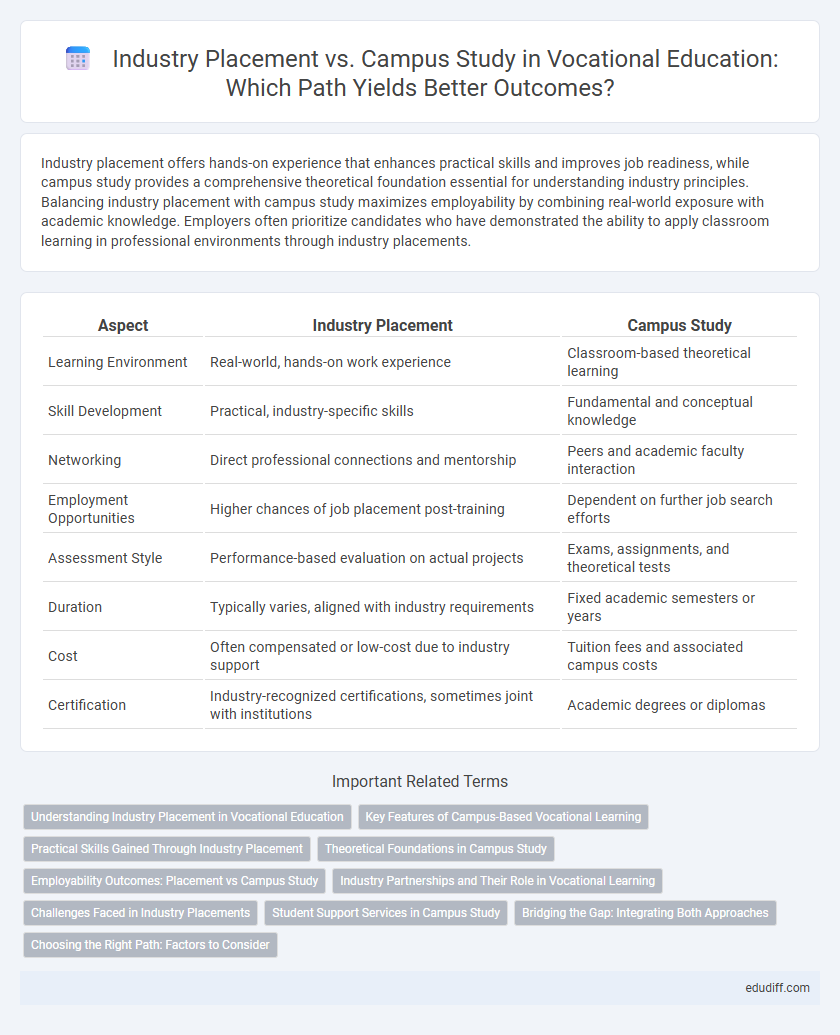Industry placement offers hands-on experience that enhances practical skills and improves job readiness, while campus study provides a comprehensive theoretical foundation essential for understanding industry principles. Balancing industry placement with campus study maximizes employability by combining real-world exposure with academic knowledge. Employers often prioritize candidates who have demonstrated the ability to apply classroom learning in professional environments through industry placements.
Table of Comparison
| Aspect | Industry Placement | Campus Study |
|---|---|---|
| Learning Environment | Real-world, hands-on work experience | Classroom-based theoretical learning |
| Skill Development | Practical, industry-specific skills | Fundamental and conceptual knowledge |
| Networking | Direct professional connections and mentorship | Peers and academic faculty interaction |
| Employment Opportunities | Higher chances of job placement post-training | Dependent on further job search efforts |
| Assessment Style | Performance-based evaluation on actual projects | Exams, assignments, and theoretical tests |
| Duration | Typically varies, aligned with industry requirements | Fixed academic semesters or years |
| Cost | Often compensated or low-cost due to industry support | Tuition fees and associated campus costs |
| Certification | Industry-recognized certifications, sometimes joint with institutions | Academic degrees or diplomas |
Understanding Industry Placement in Vocational Education
Industry placement in vocational education offers hands-on experience within real-world work environments, enabling students to develop practical skills that align with industry standards. This immersive training complements theoretical knowledge acquired through campus study by providing exposure to current technologies, workplace dynamics, and professional networking opportunities. Understanding the value of industry placement helps vocational students enhance their employability and bridge the gap between academic learning and industry demands.
Key Features of Campus-Based Vocational Learning
Campus-based vocational learning offers structured access to specialized facilities and industry-standard equipment, enabling hands-on skill development in a controlled environment. Students benefit from comprehensive curriculum integration with theoretical knowledge, supported by qualified instructors and peer collaboration. This mode emphasizes continuous assessment and academic resources, fostering a balanced blend of practical and conceptual expertise essential for industry readiness.
Practical Skills Gained Through Industry Placement
Industry placement provides hands-on experience that campus study alone cannot replicate, allowing students to develop practical skills in real-world settings such as project management, technical problem-solving, and effective communication within industry standards. This immersive exposure enhances employability by bridging the gap between theoretical knowledge and applied competencies demanded by employers. Employers increasingly prioritize candidates with industry placement experience due to their readiness to contribute effectively from day one.
Theoretical Foundations in Campus Study
Campus study emphasizes theoretical foundations through structured coursework in vocational programs, providing students with essential knowledge in industry principles, technical concepts, and analytical skills. This academic approach fosters critical thinking and problem-solving abilities by exploring case studies, research methodologies, and foundational theories. Theoretical grounding in campus study complements practical experiences by equipping students with a comprehensive understanding of industry standards, innovations, and systemic frameworks.
Employability Outcomes: Placement vs Campus Study
Industry placements provide hands-on experience, significantly enhancing employability outcomes by equipping students with practical skills and real-world problem-solving abilities. Campus study offers foundational theoretical knowledge but often lacks direct exposure to workplace dynamics, potentially delaying graduates' readiness for employment. Data shows graduates with industry placements report higher job placement rates within six months compared to those who studied solely on campus.
Industry Partnerships and Their Role in Vocational Learning
Industry partnerships play a crucial role in vocational learning by bridging the gap between theoretical knowledge and practical skills through industry placements. These collaborations enable students to gain hands-on experience, understand current workplace demands, and develop relevant technical competencies. Campus study provides foundational knowledge, but industry placements facilitated by strong partnerships ensure enhanced employability and real-world readiness.
Challenges Faced in Industry Placements
Industry placements often present challenges such as adapting to real-world work environments, managing time between job responsibilities and study requirements, and overcoming skill gaps that are less apparent in campus settings. Students may also face difficulties with workplace communication, professional networking, and handling performance expectations from employers. These challenges can impact the overall learning experience and require targeted support to ensure successful industry integration.
Student Support Services in Campus Study
Campus study offers comprehensive student support services including academic advising, career counseling, mental health resources, and workshop programs tailored to vocational skills development. These services enhance learning outcomes by providing continuous guidance and access to facilities such as libraries, technology labs, and tutoring centers. Integrated support systems in campus study environments create a structured setting that fosters personal growth and professional readiness.
Bridging the Gap: Integrating Both Approaches
Industry placement offers practical, hands-on experience that enhances students' understanding of real-world work environments, while campus study provides foundational theoretical knowledge essential for vocational education. Combining these approaches bridges the gap by enabling learners to apply academic concepts directly within professional settings, fostering skill development and workplace readiness. Integrating industry placement with campus study creates a comprehensive learning model that prepares students for successful careers in dynamic vocational industries.
Choosing the Right Path: Factors to Consider
Evaluating Industry Placement versus Campus Study involves analyzing factors such as practical skill acquisition, real-world experience, and immediate employability outcomes. Industry placements provide hands-on training and networking opportunities in professional environments, enhancing job readiness. Campus study emphasizes theoretical knowledge and foundational concepts, which can be crucial for advanced learning and career flexibility.
Industry Placement vs Campus Study Infographic

 edudiff.com
edudiff.com